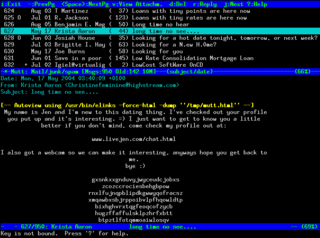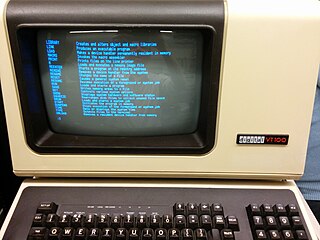
Bash is a Unix shell and command language written by Brian Fox for the GNU Project as a free software replacement for the Bourne shell. First released in 1989, it has been used as the default login shell for most Linux distributions. Bash was one of the first programs Linus Torvalds ported to Linux, alongside GCC. A version is also available for Windows 10 and Windows 11 via the Windows Subsystem for Linux. It is also the default user shell in Solaris 11. Bash was also the default shell in versions of Apple macOS from 10.3 to the 2019 release of macOS Catalina, which changed the default shell to zsh, although Bash remains available as an alternative shell.

A shell script is a computer program designed to be run by the Unix shell, a command-line interpreter. The various dialects of shell scripts are considered to be scripting languages. Typical operations performed by shell scripts include file manipulation, program execution, and printing text. A script which sets up the environment, runs the program, and does any necessary cleanup or logging, is called a wrapper.

The World Wide Web (WWW), commonly known as the Web, is an information system enabling documents and other web resources to be accessed over the Internet.
ScriptBasic is a scripting language variant of BASIC. The source of the interpreter is available as a C program under the LGPL license.

A bookmarklet is a bookmark stored in a web browser that contains JavaScript commands that add new features to the browser. They are stored as the URL of a bookmark in a web browser or as a hyperlink on a web page. Bookmarklets are usually small snippets of JavaScript executed when user clicks on them. When clicked, bookmarklets can perform a wide variety of operations, such as running a search query from selected text or extracting data from a table.

Cross-site scripting (XSS) is a type of security vulnerability that can be found in some web applications. XSS attacks enable attackers to inject client-side scripts into web pages viewed by other users. A cross-site scripting vulnerability may be used by attackers to bypass access controls such as the same-origin policy. Cross-site scripting carried out on websites accounted for roughly 84% of all security vulnerabilities documented by Symantec up until 2007. XSS effects vary in range from petty nuisance to significant security risk, depending on the sensitivity of the data handled by the vulnerable site and the nature of any security mitigation implemented by the site's owner network.
A dialer or dialler is an electronic device that is connected to a telephone line to monitor the dialed numbers and alter them to seamlessly provide services that otherwise require lengthy National or International access codes to be dialed. A dialer automatically inserts and modifies the numbers depending on the time of day, country or area code dialed, allowing the user to subscribe to the service providers who offer the best rates. For example, a dialer could be programmed to use one service provider for international calls and another for cellular calls. This process is known as prefix insertion or least cost routing. A line powered dialer does not need any external power but instead takes the power it needs from the telephone line.

Mutt is a text-based email client for Unix-like systems. It was originally written by Michael Elkins in 1995 and released under the GNU General Public License version 2 or any later version.
Plain Old Documentation (pod) is a lightweight markup language used to document the Perl programming language as well as Perl modules and programs.
The MH Message Handling System is a free, open source e-mail client. It is different from almost all other mail reading systems in that, instead of a single program, it is made from several different programs which are designed to work from the command line provided by the shell on Unix-like operating systems. Another difference is that rather than storing multiple messages in a single file, messages each have their own separate file in a special directory. Taken together, these design choices mean that it is very easy and natural to script actions on mail messages using the normal shell scripting tools.

Kontact is a personal information manager and groupware software suite developed by KDE. It supports calendars, contacts, notes, to-do lists, news, and email. It offers a number of inter-changeable graphical UIs all built on top of a common core.
Ajax is a set of web development techniques that uses various web technologies on the client-side to create asynchronous web applications. With Ajax, web applications can send and retrieve data from a server asynchronously without interfering with the display and behaviour of the existing page. By decoupling the data interchange layer from the presentation layer, Ajax allows web pages and, by extension, web applications, to change content dynamically without the need to reload the entire page. In practice, modern implementations commonly utilize JSON instead of XML.
Disposable email addressing, also known as DEA or dark mail, refers to an approach which involves a unique email address being used for every contact, entity, or for a limited number of times or uses. The benefit is that if anyone compromises the address or utilizes it in connection with email abuse, the address owner can easily cancel it without affecting any of their other contacts.
Email harvesting or scraping is the process of obtaining lists of email addresses using various methods. Typically these are then used for bulk email or spam.
A webform, web form or HTML form on a web page allows a user to enter data that is sent to a server for processing. Forms can resemble paper or database forms because web users fill out the forms using checkboxes, radio buttons, or text fields. For example, forms can be used to enter shipping or credit card data to order a product, or can be used to retrieve search results from a search engine.
In computing, a shebang is the character sequence consisting of the characters number sign and exclamation mark at the beginning of a script. It is also called sharp-exclamation, sha-bang, hashbang, pound-bang, or hash-pling.

In computing, help is a command in various command line shells such as COMMAND.COM, cmd.exe, Bash, qshell, 4DOS/4NT, Windows PowerShell, Singularity shell, Python, MATLAB and GNU Octave. It provides online information about available commands and the shell environment.
A scripting language or script language is a programming language that is used to manipulate, customize, and automate the facilities of an existing system. Scripting languages are usually interpreted at runtime rather than compiled.

A command-line interpreter or command-line processor uses a command-line interface (CLI) to receive commands from a user in the form of lines of text. This provides a means of setting parameters for the environment, invoking executables and providing information to them as to what actions they are to perform. In some cases the invocation is conditional based on conditions established by the user or previous executables. Such access was first provided by computer terminals starting in the mid-1960s. This provided an interactive environment not available with punched cards or other input methods.

Shellshock, also known as Bashdoor, is a family of security bugs in the Unix Bash shell, the first of which was disclosed on 24 September 2014. Shellshock could enable an attacker to cause Bash to execute arbitrary commands and gain unauthorized access to many Internet-facing services, such as web servers, that use Bash to process requests.








